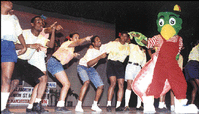

Students perform on PALS Day with Perky Parrot. - File
By Merrick Andrews,
Staff Reporter
KERICE WEDDERBURN still recalls the time she almost dug out the eye of a girl she had a quarrel with.
"I did it with my fingers," said the 12-year-old of her attack on the girl, adding, "She now has a big scar."
Also, Kerice related stories about her former habit of swearing and general disobedience in class and at home.
Damarli Smith, 11, said he used to like making people trip and fall. "... And if you hit me first I would damage you. I liked kissing my teeth," said the student of Tarrant Primary School, Kingston.
On March 7, 2000 on "Peace Day" the two told The Gleaner of a time when they used their devilish pranks to hurt others and to vent their anger.
Thanks to the PALS programme (Peace and Love in Schools) the two said they've started a new and cleaner chapter of their lives.
"PALS has taught me to share, to be loving, kind, and how to care about each other, and not just ourselves," said Kerice.
Damarli still has a sly grin but he also has a welcoming approach. "PALS teaches me not to be piggish and not to hurt my friends again. I learn a lot of good stuff; for example, to apologise, to say 'Excuse me', 'Thank you', and it teaches me how to behave well in public," he said.
PALS is not only effective in the Corporate Area of Kingston and St. Andrew where the level of violence is usually higher; schools on the North Coast are also having a more peaceful existence because of the programme which is almost seven years old.
"At Ocho Rios High, the principal and staff have indicated to me that the level of violence has decreased -- partly due to the PALS programme," said Juanita Peekvary, an American PALS volunteer working there.
Miss Peekvary came to Jamaica in 1997 as a US Peace Corps volunteer to work in Mount Edgecombe, Runaway Bay, St. Ann, but later contacted PALS on the advice of a colleague.
PALS is a non-profit foundation dedicated to teaching children how to resolve issues peacefully, in this way changing attitudes and promoting conflict-resolution in Jamaican society. The programme is the brainchild of media owners and was born of their concern about the high level of violence in schools and the society. The PALS board of directors represents a broad coalition. The media, the Jamaica Teachers' Association, the Jamaica Council of Churches, the Ministries of Health and Education, are all represented on the board.
Some 300 of the island's 800-plus schools have "implemented the PALS programme in a structural and systematic way or are approaching that manner," said Janilee Abrikian, PALS' general manager Janilee.
The programme is aimed mainly at the primary school level, but it has been introduced into several high schools, at their request, she said.
The focus is on the primary level because "initially, it was felt that if you start with young ones you would create the values about peace at a substantial level, but when you wait until they are old enough, it will be difficult to curb them in a new direction," Mrs. Abrikian explained .
"Peace Day", "Superpals I" (involving the inner-cities of Kingston) and "Super Pals II" (involving schools on the North Coast) are three major projects that have been implemented since PALS' inception.
Since its inception in 1996 "Peace Day" has been celebrated on the first Tuesday of March every year and will be observed on March 6 this year. The objective of the day's observation is to create an awareness among schools and the public about the need for peace.
Located at The Gleaner's head office, 7 North Street, central Kingston, PALS Jamaica is supported by a team of volunteers throughout the island which assists in training programmes and fund-raising activities for the organisation. Also, teachers have played a substantial role in the success of the programme.
Miss Peekvary, a pastor by profession, is fond of her PALS job. "I am just excited, excited about it," she said.
Mrs. Abrikian believes the programme will continue to be successful "if they (schools) do what we advise them to do, although it is increasingly difficult for us without the necessary financing to continue operations".































































